Posted on: 23 February 2023
We’d like your views on our weekly update so that we can continue to refine and improve our communications. Please take a couple of minutes to give your feedback at West Yorkshire Health and Care Partnership Weekly Update (smartsurvey.co.uk)
This week’s leadership message comes from Rob Webster, CEO Lead for West Yorkshire Health and Care Partnership and CEO for NHS West Yorkshire Integrated Care Board. Rob talks about palliative and end of life care and why we should all care.
Palliative and end of life care, why we should all care
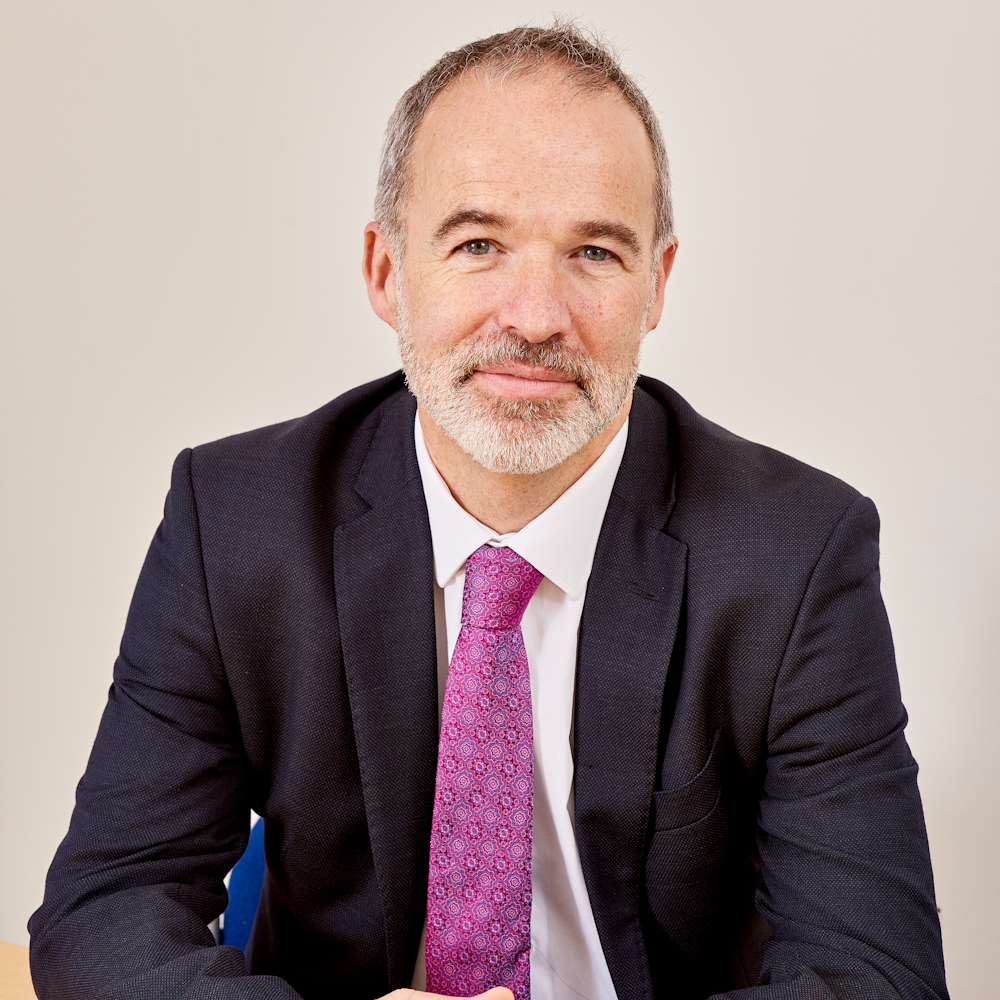 Hello, my name is Rob
Hello, my name is Rob
Here in West Yorkshire, we want everyone to have the best start in life, to be supported to live well and to die in the place of their choosing, surrounded by the people who matter to them. This idea of a good death that does honour to a whole life is something we should aspire to ensure every person can experience. Talking about death, whilst sometimes a taboo, is an important aspect of healthcare that is often misunderstood or overlooked.
I have visited most of the hospices in West Yorkshire over the years and accompanied palliative care teams visiting people at the end of life in our communities. At their best, these experiences have been characterised by a calmness, serenity, and some sense of relief for people and their families. They are staffed by people who are kind, compassionate and caring in a way that is ideally suited to end-of-life care. They know there will be no second chances to get this right and so do all they can to ensure people get what they need. The fact that this is the area I have received most compliments about in my career, suggests they succeed on a regular basis.
At West Yorkshire Health and Care Partnership we are ambitious for the palliative and end of life care people can expect. The West Yorkshire Hospice Collaborative is a key partner in our new Integrated Care Board (ICB), strengthening networks of care and support to people living across West Yorkshire. The Collaborative has 10 hospices in total, with Eight hospices for adults and two children’s hospices providing expertise, influence, and experience to improve palliative and end of life care.
Our hospices support thousands of people during some of the most acute and critical times a person can experience. We are really proud of the provision and expertise in our area - whilst not everyone is comfortable learning about hospice care , we want to share the innovative, caring and tailored practices these hospices are providing so people have full control and choice when it is needed.
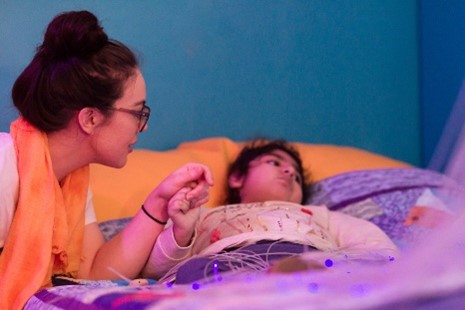 We are guided by the Ambitions Framework, a national set of aims including:
We are guided by the Ambitions Framework, a national set of aims including:
Ambition 1 – Each person is seen as an individual
Ambition 2 – Each person gets fair access to care
Ambition 3 – Maximising comfort and wellbeing
Ambition 4 – Care is co-ordinated
Ambition 5 – All staff are prepared to care
Ambition 6 – Each community is prepared to help.
In West Yorkshire, we have taken it one step further. We are absolutely committed to developing a vision of palliative and end of life care to enable people to die in a place of their choice, with people important to them and their end of life wishes in place.
This vision can only be delivered by collaborating through our heath, social care, voluntary community social enterprise sector (VCSE) and lived experience partners and by assessing the support we provide in relation to the national Ambitions Framework.
Hospice services are open to everyone and are free, inclusive, non-denominational and holistic. Our hospices are charities. They generate most of the income they spend on services. Volunteers are integral to support their work and outreach. Their primary goal is to improve the quality of life for people with serious illnesses. They provide physical, emotional, and spiritual support to both them and their families; helping them cope with the symptoms of the illness whilst managing pain. This can help people and families feel more comfortable, relaxed, and at peace, even in the face of a life-threatening illness. They support the whole person, not just the physical symptoms of an illness. This is why it is so important to understand the diversity, psychology, social, and spiritual aspects of a person's life in palliative and end of life care.
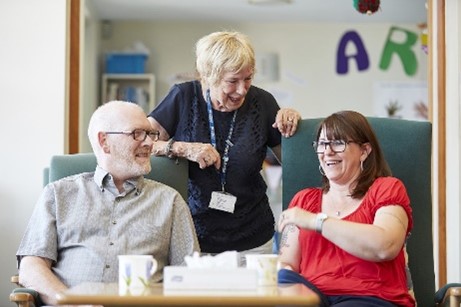 For families and caregivers, hospices can be a lifeline caring about the physical and emotional demands caring for someone at the end of their life can cause. They are instrumental within the healthcare system, improving treatment outcomes and resources. They provide support to the whole person, not just their illness. This holistic approach to care can help patients and their families feel more supported and less isolated during a difficult time.
For families and caregivers, hospices can be a lifeline caring about the physical and emotional demands caring for someone at the end of their life can cause. They are instrumental within the healthcare system, improving treatment outcomes and resources. They provide support to the whole person, not just their illness. This holistic approach to care can help patients and their families feel more supported and less isolated during a difficult time.
Hospice services are much wider ranging than many think. Services range beyond palliative care to respite breaks, symptom control, pain and medicine management, carer support, family support, bereavement support and counselling and training. These take place in the hospice and in the wider community and in people’s homes.
One of areas that I, and the Partnership through our hospices, feels strongly about is diversity – and all the challenges, changes and opportunities this brings. Last year I visited Manorlands Hospice with our programme manager Charlotte Goulding. I saw first-hand that if we start with people and listen, learn, understand – we can create services that reflect our communities.
I know we have great expertise in West Yorkshire and we have some pioneering work in progress. I am proud that the hospices collectively are helping to drive the changes we want to see in end of life care.
Death, grief and loss are universal. However, the sharpness of that experience is tempered by supportive and tailored care. We want people to be comfortable and at peace. We want families and loved ones to find closure and healing in happy memories. We want our region to be known for its approach to palliative and end of life care and we want to start the conversation to ensure people’s wishes are at the centre of their treatment and this is compassionate, informed, kind, local and personal.
Finally, I would like to thank all our palliative care teams across West Yorkshire. The last three years have seen exceptional numbers of deaths in exceptional circumstance. During this time, you have been magnificent. Thank you.
Here’s to a good death, available to us all.
Rob
This week’s blog comes from Karen Parkin, Operational Director of Finance for Wakefield District Health and Care Partnership @WakefieldHCP
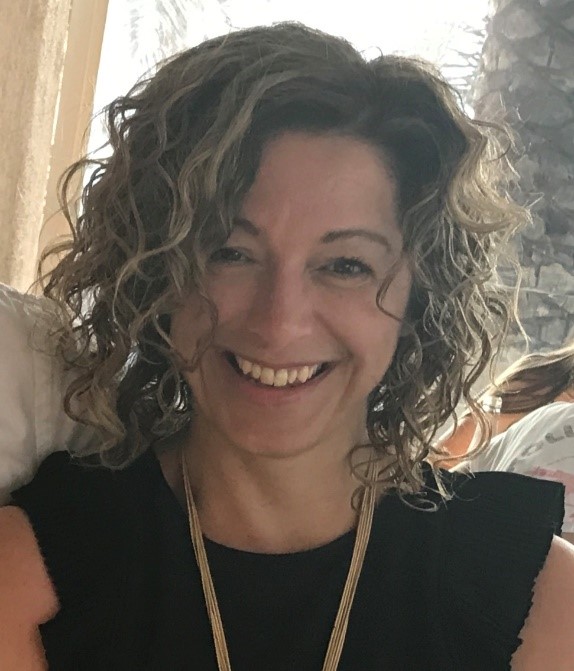 Hello everyone, my name is Karen
Hello everyone, my name is Karen
As an Integrated Care Board Finance Team, we are keen to encourage new talent into the work we do and have recently applied for two finance trainees from the NHS Graduate Management Trainee Scheme which has an excellent reputation. I’m delighted to be managing the overall programme of training over the next three years. I was keen to take on the role as I fondly remember my own graduate training in Nottinghamshire.
The programme is designed to provide graduates with continued academic learning alongside valuable practical experience. It also aims to encourage them to enhance their natural strengths, to understand what it really means to be part of a team, to encourage self-motivation, to be an independent thinker, be purposeful, and work compassionately with colleagues across our health and social care partnership.
Looking back, my memories for the first few weeks on the programme, described as ‘orientation,’ led me to spend time in a GP practice, on a ward, with hospital porters, and catering staff in the canteen (yes, they were still called canteens!). My favourite part was spending time with the radiologists and pathologists, watching them performing various tests. I was fascinated by the science behind it all and the development of the technology. Later, after I had achieved my accountancy qualification and I had worked for a few years, my favourite role as a finance manager was business partnering with the diagnostics departments both at Kings Mill Hospital in Mansfield and later at Pinderfields Hospital in Wakefield. I loved those roles and worked on some fulfilling projects. Procurement of the MRI scanners after the private finance initiative was completed at Pinderfields was a particular highlight.
It is also important that we attract and recruit talented graduates from a wide range of diverse backgrounds. If we do not, then how can we expect to influence decision making that changes services for our population for the better. Having diversity in the workforce brings understanding and compassion for people and communities we serve. We must also strive to retain our talent which is why it is so important to provide them with a good grounding in our NHS system and provide them with opportunities to learn from good practice.
We should also use the benefits of the NHS Graduate Management Trainee Scheme for our other schemes to ensure that young people or new entrants into the NHS equally receive a good grounding and good training experience. It is within our gift to ensure that young apprentices, our sandwich placement students, staff studying through the leadership academy, and more experienced staff joining us via other schemes, are given a good all-round experience in their first year.
I am looking forward to once again, managing our finance trainees and hope I can also live up to their expectations but will absolutely do my best to ensure our Integrated Care Board lives up to it.
Thank you for reading and have a lovely weekend.
Karen
Preparing for Ramadan
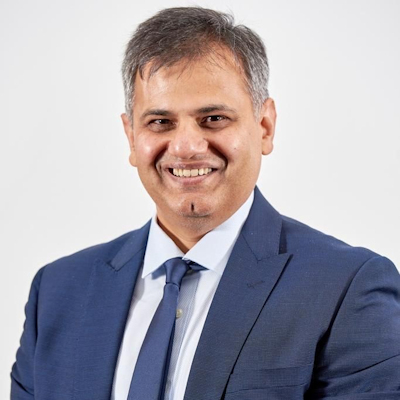 Dr Sohail Abbas, Deputy Medical Director for NHS West Yorkshire Integrated Care Board and Dr Waqas Tahir, Clinical Diabetes Lead, West Yorkshire Health and Care Partnership, help people prepare for Ramadan and share their thoughts here.
Dr Sohail Abbas, Deputy Medical Director for NHS West Yorkshire Integrated Care Board and Dr Waqas Tahir, Clinical Diabetes Lead, West Yorkshire Health and Care Partnership, help people prepare for Ramadan and share their thoughts here.
The holy month of Ramadan begins next month (22 March – 21 April) and will be observed by Muslims in Britain and around the world as a month of fasting (sawm), prayer, reflection, and community engagement.
Ramadan is an exciting time for us and our families. As we alter our routines to accommodate the fast to seek the spiritual benefits of the month, we can also look to material gains in our health. This can be through maintaining the Ramadan spirit and discipline in moderating our diet to lose weight, stopping smoking, and continuing to practice mindfulness to promote good mental health.
For people with some long-term health conditions, Ramadan can be demanding. Ultimately, if you have such a condition, whether to fast or not is a very personal decision, but your healthcare professionals are here to support you.
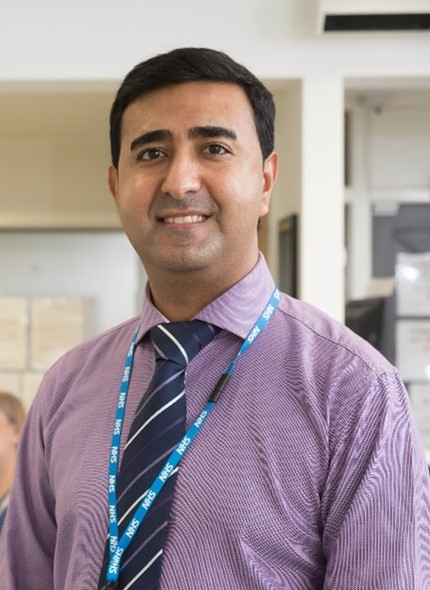 As doctors, we want to help our community to plan for a happy and healthy Ramadan, so we’d encourage people to talk to their healthcare team about their faith and their physical and mental health. This is particularly important if they have an existing medical condition, such as diabetes, high blood pressure, epilepsy, and want to talk about their medication and changes to their daily routine.
As doctors, we want to help our community to plan for a happy and healthy Ramadan, so we’d encourage people to talk to their healthcare team about their faith and their physical and mental health. This is particularly important if they have an existing medical condition, such as diabetes, high blood pressure, epilepsy, and want to talk about their medication and changes to their daily routine.
These simple steps can help everyone have a successful and healthy fast:
- Take breaks – take a couple of short breaks instead of a lunch break
- Stay hydrated – in the non-fasting hours, drink plenty of water to help your body stay hydrated. Try to avoid tea, coffee and salty foods as these can cause dehydration, which can in turn cause headaches and fatigue
- Eat well – when not fasting, it’s tempting to indulge in unhealthy foods, but it’s important to eat a healthy balanced diet for our bodies and our brains
- Stay active – many of us, including us GPs, often spend most of the day at our desks. This is never healthy, but when we’re fasting, we may be more tempted to rest rather than be active. Exercise is good for our bodies and for our minds, so try to incorporate some light physical activity into your day, such as going for a walk after iftar
- Do what you can to prepare – for example, if you usually drink caffeinated drinks such as tea, coffee or cola, the lack of caffeine during the fast may initially lead to headaches and tiredness. This should ease as your body adjusts to going without caffeine, but you can help by cutting down on tea and coffee or trying decaffeinated drinks for a couple of weeks before Ramadan starts
Finally, we’d like to wish everyone a happy and healthy Ramadan.
You can read more on our website.
What else has been happening this week?
Get involved in new West Yorkshire Voice to help influence health and care decisions
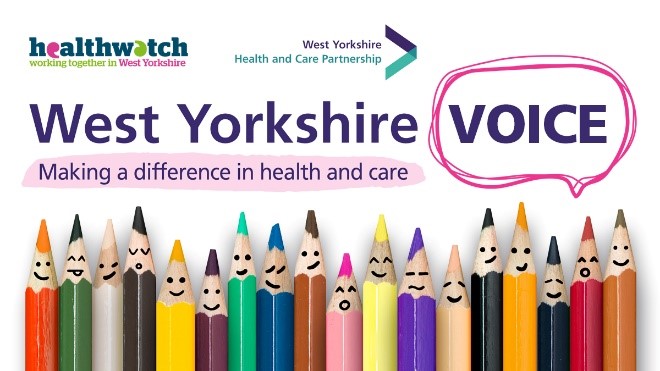 People and communities across West Yorkshire are being invited to be part of a new network called ‘West Yorkshire Voice’ (making a difference in health and care). This network will play an important role in influencing decision-making across the area, including the work of the NHS West Yorkshire Integrated Care Board. With already strong mechanisms in place to hear from people in Bradford District and Craven, Calderdale, Kirklees, Leeds and Wakefield District, our Partnership wants to build on this by giving people an opportunity to also take part in the new West Yorkshire Voice. The working group met this week. The work is being led by Healthwatch organisations. A recruitment campaign to invite people to take part will launch early March.
People and communities across West Yorkshire are being invited to be part of a new network called ‘West Yorkshire Voice’ (making a difference in health and care). This network will play an important role in influencing decision-making across the area, including the work of the NHS West Yorkshire Integrated Care Board. With already strong mechanisms in place to hear from people in Bradford District and Craven, Calderdale, Kirklees, Leeds and Wakefield District, our Partnership wants to build on this by giving people an opportunity to also take part in the new West Yorkshire Voice. The working group met this week. The work is being led by Healthwatch organisations. A recruitment campaign to invite people to take part will launch early March.
COVID Vaccination update
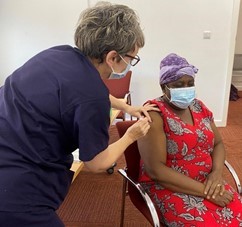 The autumn booster offer has now come to an end, with the 12 February being the final date for people to get the top-up jab. In total, 700,747 eligible people across West Yorkshire came forward for their booster during the campaign, with services seeing a slight flurry over the past two weeks after the cut-off date was announced. Our primary care networks and community pharmacy colleagues have again played a vital role in delivering the vital top up jab and they and other vaccination teams have continued to use a wide variety of approaches to encourage people to get protected.
The autumn booster offer has now come to an end, with the 12 February being the final date for people to get the top-up jab. In total, 700,747 eligible people across West Yorkshire came forward for their booster during the campaign, with services seeing a slight flurry over the past two weeks after the cut-off date was announced. Our primary care networks and community pharmacy colleagues have again played a vital role in delivering the vital top up jab and they and other vaccination teams have continued to use a wide variety of approaches to encourage people to get protected.
First and second doses will continue to be available for anyone who has not yet had these vaccinations. Although many services will be paused now that the booster offer has ended, there are still services operating. People can book appointments online at www.nhs.uk/covidvaccine or by calling 119, or use the national site finder (www.
We are also making plans for delivering an additional booster to some particularly vulnerable groups this Spring, which the Joint Committee on Vaccination and Immunisation has said is likely to be needed.
Bowel Cancer Screening Campaign
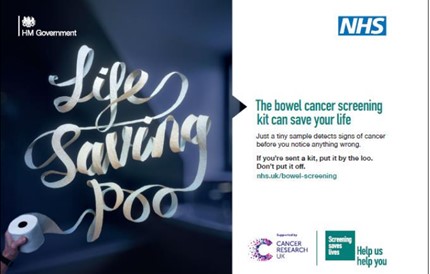 The latest phase of NHS England’s ‘Help Us, Help You’ campaign aims to encourage people who are sent the NHS bowel cancer screening home test kit to complete and return it. The campaign launched on Monday 20 February, and runs until 31 March 2023. It is supported by Cancer Research UK.
The latest phase of NHS England’s ‘Help Us, Help You’ campaign aims to encourage people who are sent the NHS bowel cancer screening home test kit to complete and return it. The campaign launched on Monday 20 February, and runs until 31 March 2023. It is supported by Cancer Research UK.
Improving Population Health Programme Board
The Improving Population Health Programme Board met on the 15 February 2023. Members considered new ways of working as well as the improving population health input into the Partnership’s Five-Year Joint Forward Plan refresh.
The Board reflected on work being carried out across the six programme areas: climate change; health and housing; health inequalities; prevention; suicide prevention; and the West Yorkshire Combined Authority.
Initiatives in the last month include the recruitment to the next cohort of Improving Population Health Fellows; launch of #MumsCan, a campaign to support young pregnant women who want to stop smoking and training to empower colleagues to take action on carbon emissions. We’re getting ready for our third Adversity, Trauma and Resilience Knowledge Exchange 21-23 March and are carrying out activities in support of two education awareness weeks running this week and next week.
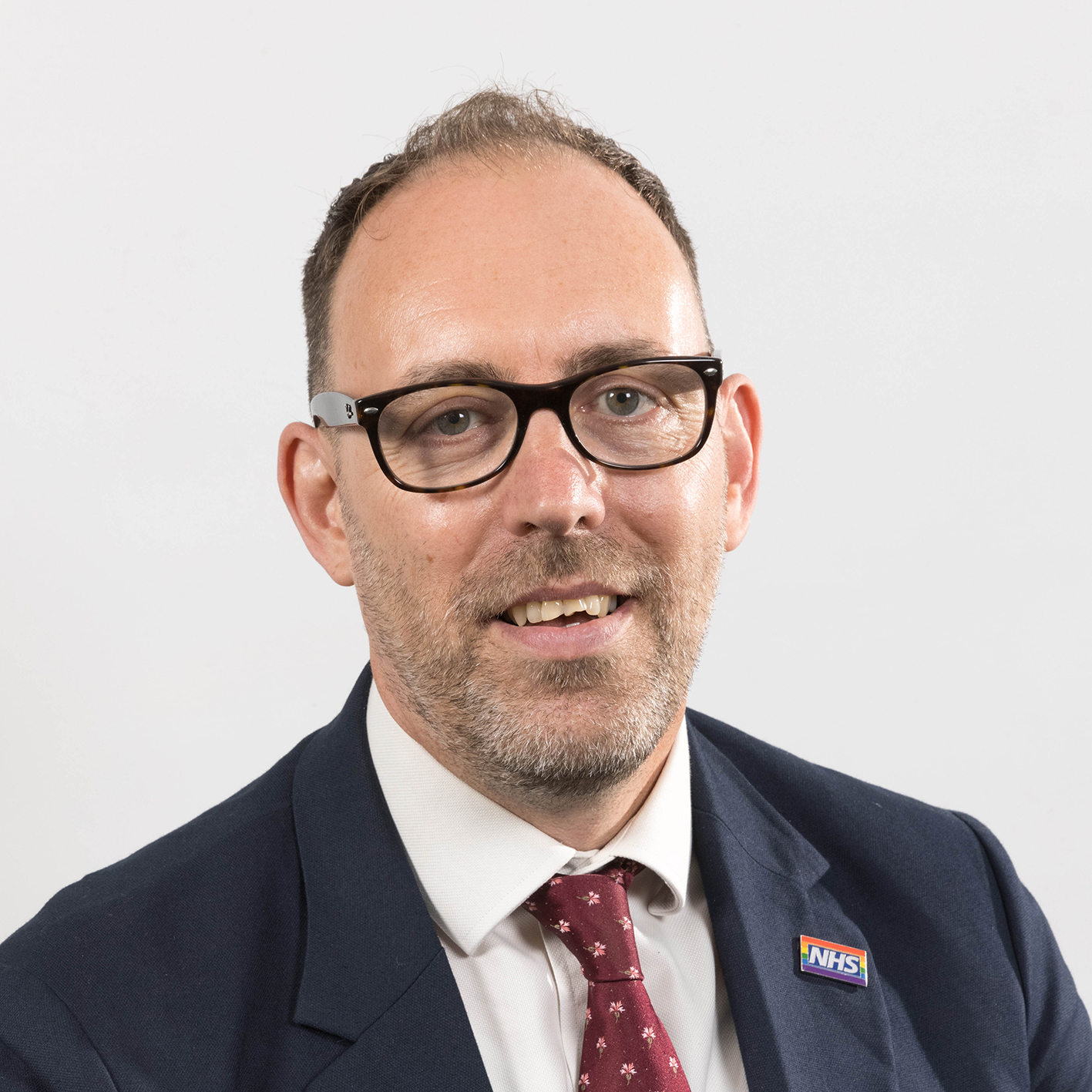 On behalf of the West Yorkshire Housing Association Partnership, we are designing a new ‘right sizing’ campaign to influence perceptions of housing with support across West Yorkshire. Next month we’ll hold an event to mark becoming a Partnership of Sanctuary and being recognised for providing welcoming and accessible health care services to refugees and people forced to flee their homes.
On behalf of the West Yorkshire Housing Association Partnership, we are designing a new ‘right sizing’ campaign to influence perceptions of housing with support across West Yorkshire. Next month we’ll hold an event to mark becoming a Partnership of Sanctuary and being recognised for providing welcoming and accessible health care services to refugees and people forced to flee their homes.
The Board is chaired by Robin Tuddenham, Place Lead for Calderdale for NHS West Yorkshire Integrated Care Board, CEO for Calderdale Council and Dr James Thomas, Medical Director, NHS West Yorkshire Integrated Care Board.
NHS West Yorkshire Joint Forward Plan
Building on the West Yorkshire Health and Care Partnership Five-Year Strategy ‘Better health and wellbeing for everyone’ published in 2020, the Partnership has coproduced a refreshed draft Integrated Care Strategy. The Partnership has been seeking people’s views on how its ambitions for the NHS will be achieved in a new Joint Forward Plan for the area. The plan is expected to be published by 30 June 2023. The consultation closed on Monday 20 February. More information is available on the Partnership’s website at wypartnership.co.uk/your-views
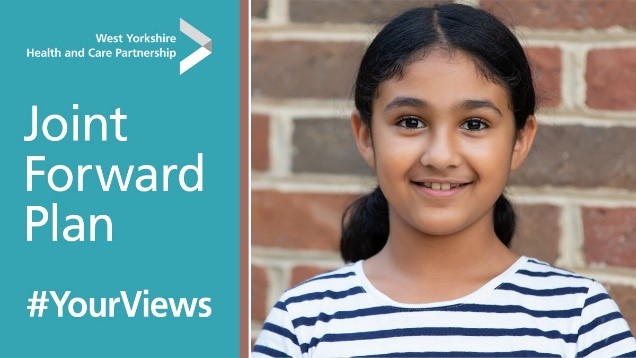 A consultation mid-review report has been published on our website. The key themes from mid-report review are:
A consultation mid-review report has been published on our website. The key themes from mid-report review are:
- Money, budget and finance and spend
- Access to services, especially GPs and dentists
- Get the basics right – this means care and services
- Workforce
- Coordination / being joined up
The full report findings will be published early March.
Partnership’s People Board
The People Board met on the 21 February. It was chaired by Kate Sims, NHS West Yorkshire Integrated Care Board People Director. The themes for the meeting were’ looking after our people’ and ‘belonging to West Yorkshire Health and Care Partnership’.
Agenda items included suicide prevention, Leeds health and wellbeing community of practice, a West Yorkshire retention steering group proposal and tackling health inequalities for minority ethnic communities and colleagues. There was also an update on the work of voluntary community social enterprise sector partners.
Suicide is West Yorkshire’s biggest killer of men under 50 and our biggest killer of young people. We have collectively agreed that we will work together to reduce the suicide rate by 10% over the next five years – this is one of our Partnership’s 10 big ambitions. The Office of National Statistics releases suicide data annually in September which summarises coroner registrations for the previous year. There was a conversation around how we co-create a movement for change together as a system. This includes addressing stigma and supporting staff to bring their whole self to work. Suicide prevention training for staff is important and there was a conversation about life-long learning, with different knowledge and skills needed at different times. There are also opportunities for staff to get involved as change makers across the Partnership.
There was a presentation from Leeds about being a healthy and caring city for all ages, where the poorest improve their health the fastest – where their workforce is predominantly citizens of Leeds (as part of their inclusive growth strategy). The work involves:
- Integrating the health and social care workforce
- Narrowing the inequalities gap
- Benefitting from strengths and diversity
- Promoting a learning culture
- Driving inclusive growth
- Optimising the Leeds pound
- Person-centred, not constrained by organisational boundaries
Key to the above is capturing learning and evaluation for continual improvement – with the aim of driving quality forward together. Board members discussed the sharing of good practice, the central resource site for signposting and tracking access to help and support.
Retention is an indicator of performance against the pillars of the ‘People Promise’ and requires collaborative approaches and plans to ensure West Yorkshire is an attractive and supportive place to work. A review of the way in which we lead the work as part of the ‘People Promise’ was discussed. The work is part of our Partnership’s People Plan. A proposal was discussed which would involve co-developing an approach as part of our workforce strategy to cover retention, progression and mobility. The next steps involve bringing colleagues together for wider system wide thinking.
Our Partnership is committed to ensuring that addressing health inequalities is embedded into our way of working; ensuring that change is felt across the system and reaches the grass roots of our communities. Work continues across the area with local places having excellent examples of compassionate leadership and recruitment from underrepresented groups of people. There was an update on the recommendations from the race review, including diverse leadership, fair access to roles and the inclusive recruitment toolkit, which has achieved great success. Members discussed the importance of sharing and encouraging wider use of the toolkit. Reciprocal mentoring and cultural competency with a pilot due to launch in the spring was also discussed.
Over 31,000 people are employed by the VCSE across West Yorkshire, with over 132,000 volunteers supporting people and communities from across 6,000 organisations. There was an update on the importance of colleagues and volunteers in all our work, and the essential role they have across all health and care sectors. It was noted that wellbeing support is available to all, and how many services they deliver across West Yorkshire as key enablers.
Colleagues are working on volunteer to employment routes and the career pathways across sectors. Other work includes recruiting local and peer pathways. There was a conversation around how we can use different recruitment processes to capture the experience of VCSE colleagues, so we don’t lose their valuable skills. Members also discussed training opportunities and fellowship funding.
Phase two Learning Disabilities Challenge
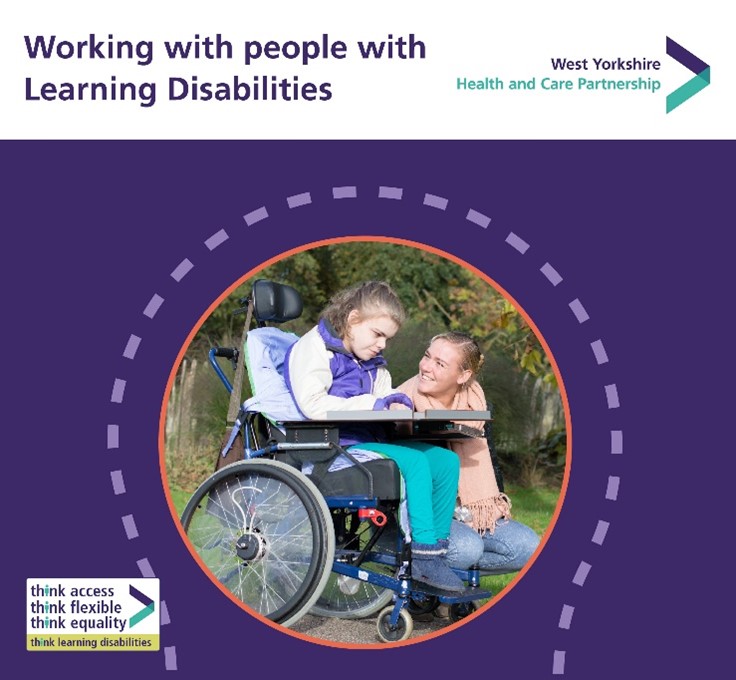 We launched our Learning Disability Challenge last year, sharing our work in transforming care for people under the themes of Start Well, Live Well , Age Well and Working with People with Learning Disabilities. Over the coming weeks we will be focusing on Working with People with Learning Disabilities.
We launched our Learning Disability Challenge last year, sharing our work in transforming care for people under the themes of Start Well, Live Well , Age Well and Working with People with Learning Disabilities. Over the coming weeks we will be focusing on Working with People with Learning Disabilities.
This animation, created for us by our Health and Care Champion partners at BTM, describes the work of the Challenge. This is the Twitter tile for the Working with people with Learning Disabilities theme. This is the Teams background for Working with people with Learning Disabilities. Please feel free to share with your own networks. If you have any case studies or projects under this theme that you would like us to promote please send them through to maryjo.
Red carpet treatment for cancer patients and nurses as Leeds cinema screens their stories
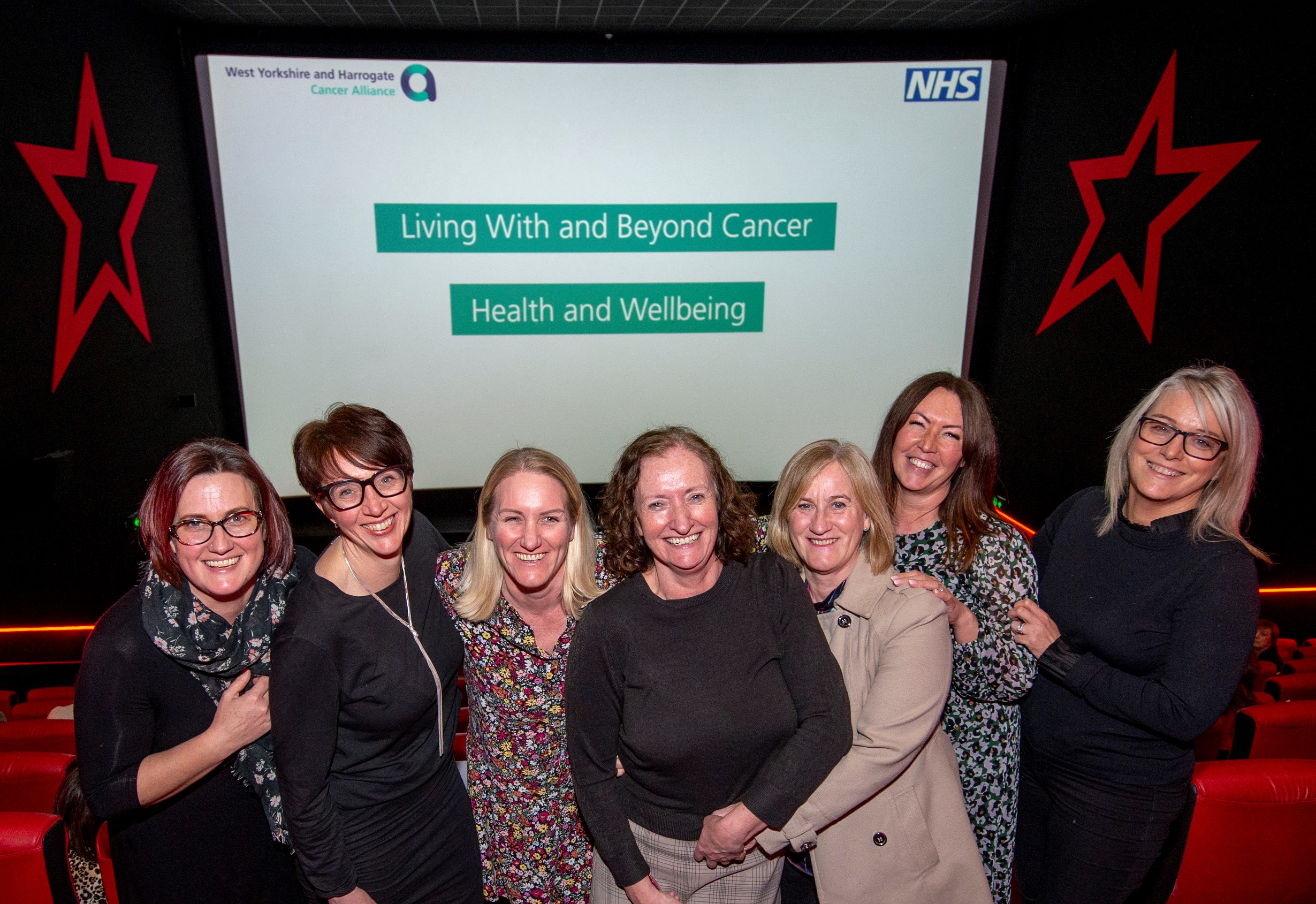 Cancer patients from West Yorkshire and Harrogate received the ‘red carpet’ treatment this week, along with their cancer nursing professionals, as they attended a cinema premiere of a series of films in which they feature to help others diagnosed with the disease.
Cancer patients from West Yorkshire and Harrogate received the ‘red carpet’ treatment this week, along with their cancer nursing professionals, as they attended a cinema premiere of a series of films in which they feature to help others diagnosed with the disease.
The patients, their families and nursing teams were guests of honour at Cineworld White Rose Centre in Leeds, for the first showing of the films which will now be used by cancer teams, charities and patient groups across West Yorkshire and Harrogate, to support those living with and beyond cancer.
Funded through the West Yorkshire and Harrogate Cancer Alliance patient education bursary, the seven films include advice for patients just finishing or on long-term cancer treatment for breast, colorectal, lung and prostate cancer, along with general health and wellbeing advice. A further film – produced in partnership with the patient led charity, Yorkshire Cancer Community (YCC) – reinforces the important role that patients play in supporting others facing the same fears and challenges after they receive a diagnosis and go on to treatment and rehabilitation.
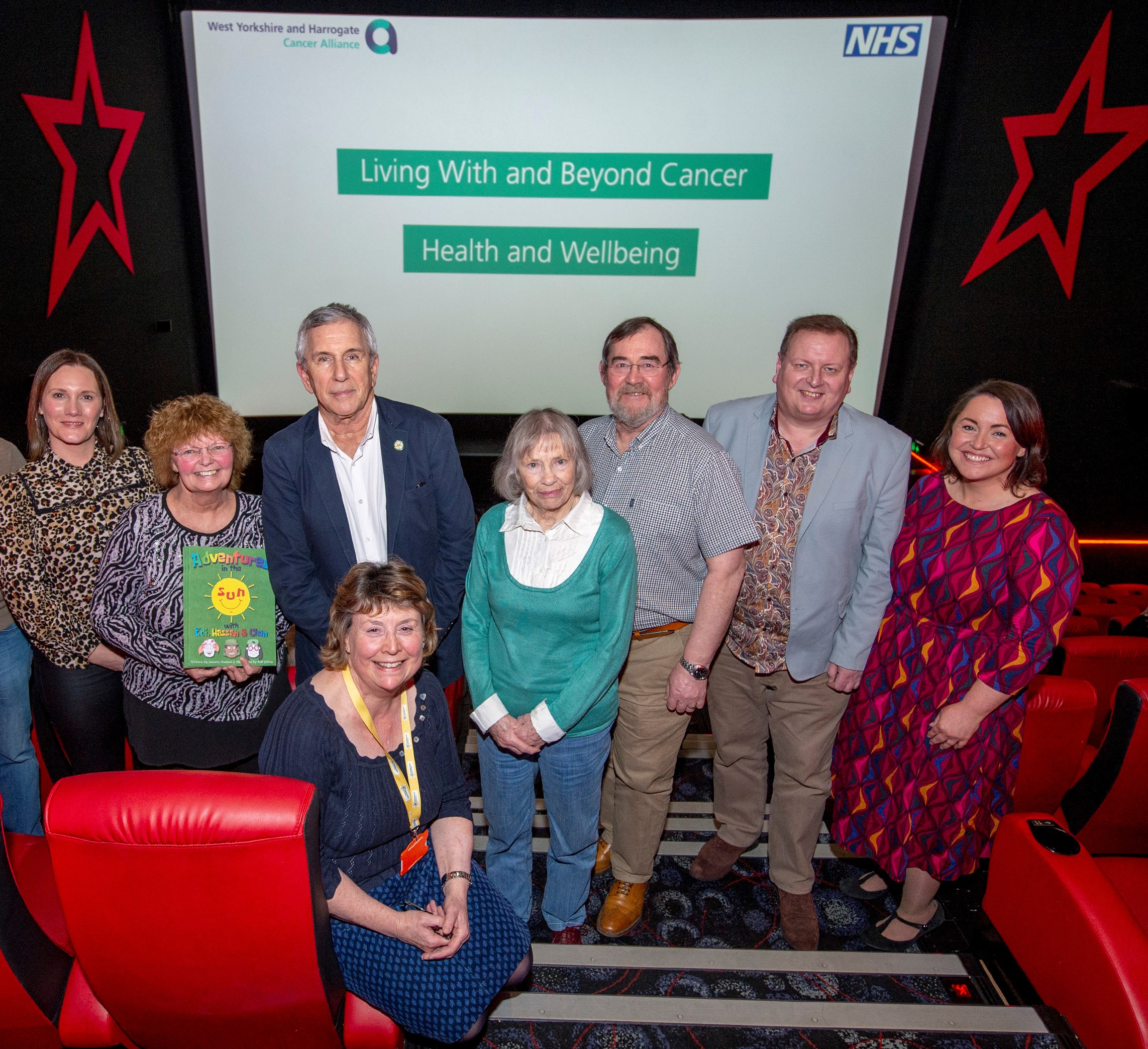 The six hospital NHS Trusts across the area collaborated on the project, along with YCC, after they submitted successful bids to the Cancer Alliance bursary scheme, which is now in its third year and is designed to boost services and support for the increasing number of patients living with and beyond cancer. Organisations and/or individuals working in GP surgeries or the community; in hospitals or specialist services, in voluntary organisations and charities, were invited to share their projects, apply for funding and explain how they could make a difference.
The six hospital NHS Trusts across the area collaborated on the project, along with YCC, after they submitted successful bids to the Cancer Alliance bursary scheme, which is now in its third year and is designed to boost services and support for the increasing number of patients living with and beyond cancer. Organisations and/or individuals working in GP surgeries or the community; in hospitals or specialist services, in voluntary organisations and charities, were invited to share their projects, apply for funding and explain how they could make a difference.
The latest videos feature Clinical Nurse Specialists (CNSs) and other health professionals, along with patient talking about their own experiences of cancer – breaking down barriers around subjects considered sensitive; challenging perceptions and mythbusting, and offering their own advice on how to deal with the impact of cancer on their everyday lives.

